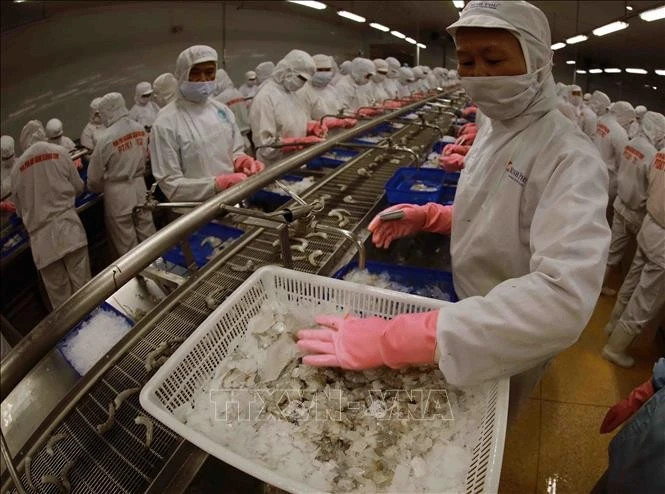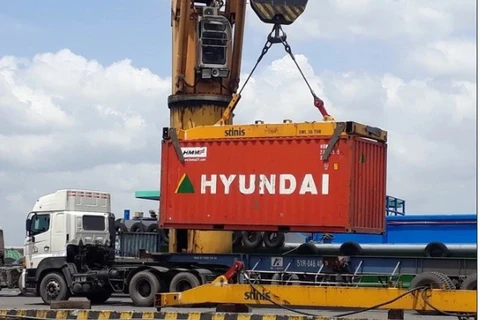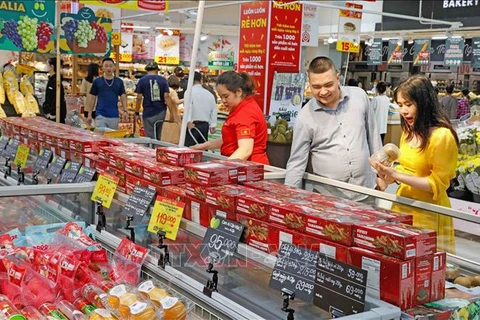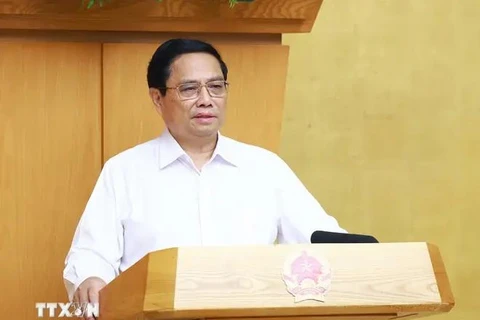
Hanoi (VNA) - The diversification of global supply chains is creating significant opportunities for Vietnam to engage more deeply in international production networks. However, along with market expansion prospects, there are challenges posed by trade tensions, the reality of climate change accompanied by natural disasters, and the requirements for carbon emissions reduction, according to experts.
Diversification creates both opportunities and challenges
In an inclusive interview granted to the Vietnam News Agency, Andrea Coppola, World Bank (WB) Lead Economist for Vietnam, said that diversifying supply chains is currently aiming at improving business resilience, which is the capacity of quickly recovering supply chain effectiveness in the face of exogenous shocks.
Vietnam, with its strong trade links with China and the US, is facing both opportunities and challenges, he said, adding that the impact of the so-called geo-economic fragmentation and the increase in tensions between the US and China on Vietnamese trade is positive, and Vietnam is able to seize this opportunity.
According to the economist, while global trade has been on a downward trajectory for more than a decade, some value chains have been relocated to Vietnam. At the same time, Vietnam has been able to deepen its trade links with the US and increase its export market share in sectors such as electronics and machinery.
However, there is still some uncertainties on the impact of the trade tensions between the US and China, given recent measures by the US on the rules of origins of steel and aluminum products imported from Mexico, as well as anti-dumping investigations of solar panels imported from Vietnam, Coppola noted, adding that these measures could signal more stringent policies applied by the world’s largest economy.
Synchronising policies to enhance value
To continue growing fast, and seize the opportunities of global trade, the expert advised Vietnam to upgrade its participation in global value chains by transition from low value added final assembly activities towards more sophisticated, more sustainable and higher value added products.
Regarding trade liberalisation, he stressed the importance of reducing non-tariff barriers, such as cumbersome customs procedures or foreign equity restrictions, to further promote trade and investment flows; and deepening trade integration, especially within Asia, to further increase market access and diversify imports and exports.
The economist went on to say that upskilling the labour force in Vietnam is very important, and enhancing the competencies of workers and also managers will enable faster technology adoption, and make workers more resilient in the face of disruptive technological changes.
He also stressed the need to strengthen infrastructure and increase energy supply while reducing the carbon intensity of Vietnamese products.
Enhancing resilience to natural disasters
In addition to diversification efforts, improving resilience to natural disasters is also a key factor in Vietnam's sustainable development strategy. Typhoon Yagi and its extensive damage serve as a reminder that supply chains need to be designed for greater sustainability, better preparedness, and quick recovery.
In this regard, Aaditya Mattoo, WB Chief Economist of the East Asia and Pacific Region, stated that in the long term, Vietnam needs to prioritise policies that build supply chains adaptive to climate change and natural disasters while safeguarding human lives. Therefore, sustainable development should not only encompass the production and export of goods such as electronics or motorcycles and cars, but also establish a barrier to protect these achievements.
Sharing the same view, Nguyen Ba Hung, the Asian Development Bank (ADB)’s Principal Country Economist in Vietnam, said enhancing the economy's resilience to the impacts of natural disasters is an urgent issue to Vietnam - a country that frequently faces these disasters.
According to Hung, the post-disaster reconstruction process should not only focus on restoring things to their original state but also aim to build and upgrade more sustainable infrastructure and facilities.
Furthermore, in the long term, Vietnam needs a systematic approach to establish standards for disaster resilience, such as developing design standards for civil and infrastructure projects, he noted.
It is also necessary to further develop the insurance market, particularly specific products to address disaster-related risks, as these are effective tools for generating resources for disaster recovery.
Property insurance, including public assets, and agricultural insurance will help individuals and businesses recover quickly after disasters, thereby promoting stable production and business activities, Hung added./.






















